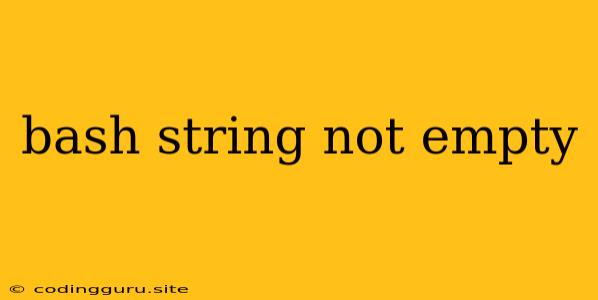Checking If a String is Not Empty in Bash: A Comprehensive Guide
When working with Bash scripts, it's crucial to determine if a string variable contains any data. This is essential for controlling the flow of your script and ensuring that your commands operate correctly. One common scenario is to check if a string is not empty before using it in a command or passing it to a function. In this article, we'll explore various methods to check if a string is not empty in Bash, providing clear explanations and examples.
Understanding the Importance of String Checks
Empty strings can lead to unexpected behavior in your Bash scripts. Here's why it's important to check for empty strings:
- Invalid Command Arguments: If a command requires a string as an argument, an empty string can cause the command to fail or produce incorrect results.
- Conditional Logic Errors: When using conditional statements (e.g.,
if,else,elif), empty strings can lead to unexpected branches in your script's execution. - Data Integrity: Ensuring that strings are not empty can help maintain the integrity of your data and prevent potential errors.
Methods to Check if a String is Not Empty
1. Using the -n Operator (String Length)
The -n operator checks if the length of a string is non-zero. If the string is not empty, it returns true (exit code 0).
string="Hello"
if [ -n "$string" ]; then
echo "The string is not empty."
fi
Example:
In this example, the string variable contains "Hello," which has a length greater than zero. Therefore, the if condition is true, and the message "The string is not empty." is printed.
2. Using the -z Operator (String Length)
The -z operator is the opposite of -n. It checks if the length of a string is zero. If the string is empty, it returns true (exit code 0).
string=""
if [ -z "$string" ]; then
echo "The string is empty."
else
echo "The string is not empty."
fi
Example:
In this example, the string variable is empty, so the if condition is true, and the message "The string is empty." is printed.
3. Using the test Command
The test command can also be used to check for empty strings. It's equivalent to the [ ] expression.
string="Hello"
if test -n "$string"; then
echo "The string is not empty."
fi
Example:
This example demonstrates how to use the test command to verify that a string is not empty.
4. Using Double Brackets [[ ]]
For more complex string checks, you can use double brackets [[ ]]. They provide enhanced features like pattern matching.
string="Hello"
if [[ -n "$string" ]]; then
echo "The string is not empty."
fi
Example:
This example uses double brackets to ensure the string has a length greater than zero.
5. Using the ! Operator (Negation)
You can combine the ! (negation) operator with the -z operator to achieve the same result as using -n.
string="Hello"
if ! [ -z "$string" ]; then
echo "The string is not empty."
fi
Example:
In this example, -z "$string" returns false because the string is not empty. The ! operator negates the result, making the if condition true.
Best Practices for Checking Empty Strings in Bash
- Consistency: Choose one method and stick with it throughout your script for clarity and maintainability.
- Quoting Variables: Always quote variables within conditional expressions to prevent unexpected behavior due to word splitting or filename expansion.
- Error Handling: Implement error handling mechanisms to handle situations where a string is expected but turns out to be empty.
Conclusion
Checking if a string is not empty is a crucial task in Bash scripting. By using the methods outlined above, you can ensure that your scripts handle strings correctly and prevent unexpected behavior. Remember to choose a method that aligns with your coding style and maintain consistency throughout your code. Employing best practices and error handling ensures the robustness and reliability of your scripts.
